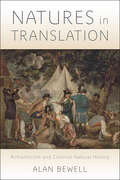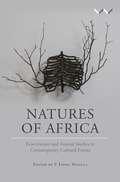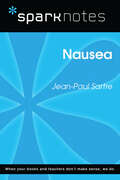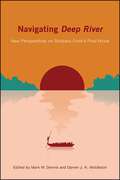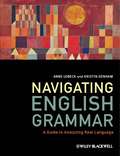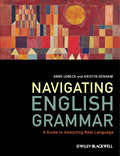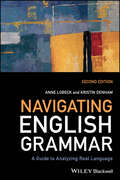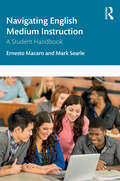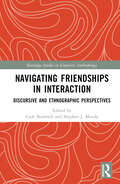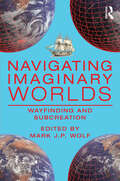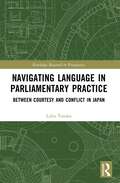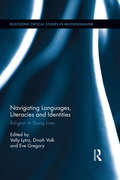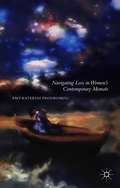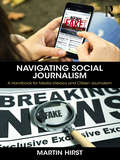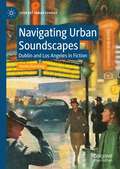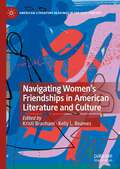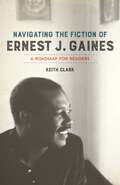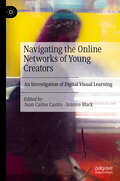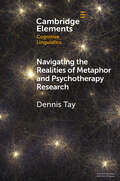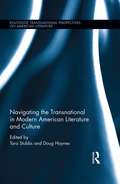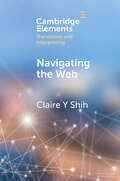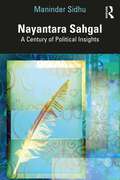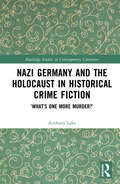- Table View
- List View
Natures in Translation: Romanticism and Colonial Natural History
by Alan BewellUnderstanding the dynamics of British colonialism and the enormous ecological transformations that took place through the mobilization and globalized management of natures.For many critics, Romanticism is synonymous with nature writing, for representations of the natural world appear during this period with a freshness, concreteness, depth, and intensity that have rarely been equaled. Why did nature matter so much to writers of the late eighteenth and early nineteenth centuries? And how did it play such an important role in their understanding of themselves and the world?In Natures in Translation, Alan Bewell argues that there is no Nature in the singular, only natures that have undergone transformation through time and across space. He examines how writers—as disparate as Erasmus and Charles Darwin, Joseph Banks, Gilbert White, William Bartram, William Wordsworth, John Clare, and Mary Shelley—understood a world in which natures were traveling and resettling the globe like never before. Bewell presents British natural history as a translational activity aimed at globalizing local natures by making them mobile, exchangeable, comparable, and representable. Bewell explores how colonial writers, in the period leading up to the formulation of evolutionary theory, responded to a world in which new natures were coming into being while others disappeared. For some of these writers, colonial natural history held the promise of ushering in a "cosmopolitan" nature in which every species, through trade and exchange, might become a true "citizen of the world." Others struggled with the question of how to live after the natures they depended upon were gone. Ultimately, Natures in Translation demonstrates that—far from being separate from the dominant concerns of British imperial culture—nature was integrally bound up with the business of empire.
Natures of Africa: Ecocriticism and animal studies in contemporary cultural forms
by F. Fiona MoollaOne of the first edited volumes to encompass transdisciplinary approaches to a number of cultural forms, including fiction, non-fiction, oral expression and digital media. Environmental and animal studies are rapidly growing areas of interest across a number of disciplines. Natures of Africa is one of the first edited volumes which encompasses transdisciplinary approaches to a number of cultural forms, including fiction, non-fiction, oral expression and digital media. The volume features new research from East Africa and Zimbabwe, as well as the ecocritical and eco-activist 'powerhouses' of Nigeria and South Africa. The chapters engage one another conceptually and epistemologically without an enforced consensus of approach. In their conversation with dominant ideas about nature and animals, they reveal unexpected insights into forms of cultural expression of local communities in Africa. The analyses explore different apprehensions of the connections between humans, animals and the environment, and suggest alternative ways of addressing the challenges facing the continent. These include the problems of global warming, desertification, floods, animal extinctions and environmental destruction attendant upon fossil fuel extraction. There are few books that show how nature in Africa is represented, celebrated, mourned or commoditised. Natures of Africa weaves together studies of narratives - from folklore, travel writing, novels and popular songs - with the insights of poetry and contemporary reflections of Africa on the worldwide web. The chapters test disciplinary and conceptual boundaries, highlighting the ways in which the environmental concerns of African communities cannot be disentangled from social, cultural and political questions. This volume draws on and will appeal to scholars and teachers of oral tradition and indigenous cultures, literature, religion, sociology and anthropology, environmental and animal studies, as well as media and digital cultures in an African context.
Nausea (SparkNotes Literature Guide Series)
by SparkNotesNausea (SparkNotes Literature Guide) by Jean-Paul Sartre Making the reading experience fun! Created by Harvard students for students everywhere, SparkNotes is a new breed of study guide: smarter, better, faster. Geared to what today's students need to know, SparkNotes provides: *Chapter-by-chapter analysis *Explanations of key themes, motifs, and symbols *A review quiz and essay topicsLively and accessible, these guides are perfect for late-night studying and writing papers
Navaratan Vidyarthi Telugu - Telugu Dictionary: నవరతన్ విద్యార్థి తెలుగు - తెలుగు నిఘంటువు
by Dr Jayanti Chakravarthiఈ పుస్తకం లో అన్ని పదాలు వివరణ తెలుగు లో అందించడం జరిగింది.
Navigating Deep River: New Perspectives on Shūsaku Endō's Final Novel
by Mark W. Dennis; Darren J. N. MiddletonIn Navigating Deep River, Mark W. Dennis and Darren J. N. Middleton have curated a wide-ranging discussion of Shūsaku Endō's final novel, Deep River, in which four careworn Japanese tourists journey to India's holy Ganges in search of spiritual as well as existential renewal. Navigating Deep River evaluates and probes Endō's decades-long search to find the words to explain Transcendent Mystery, the difficult tension between faith and doubt, the purpose of spiritual journeys, and the challenges posed by the reality of religious pluralism in an increasingly diverse world. The contributors, including Van C. Gessel who translated Deep River into English in 1994, offer an engaged and patient exploration of this major text in world fiction, and this anthology promises to deepen academic appreciation for Endō, within and beyond the West.
Navigating English Grammar: A Guide to Analyzing Real Language
by Kristin Denham Anne LobeckThe goal of this book is to provide you with tools to analyze the language you hear, speak, read, and write every day, in a variety of registers, genres, and styles, discovering the real grammatical categories and concepts that underlie your own unconscious knowledge of language.
Navigating English Grammar: A Guide to Analyzing Real Language
by Kristin Denham Anne LobeckAn engaging and fresh take on the rules and politics of English grammar, written in lively prose. It goes a step further than most books on grammar by providing an overview of the field, with a discussion of historical and current debates about grammar, and how we define, discuss, and approach it. Presents a novel, inquiry-based approach to understanding speakers' unconscious knowledge of English grammar Makes lucid connections, when relevant, with current linguistic theory Integrates language change and variation into the study of grammar Examines historical sources of socially evaluative perceptions of grammar, as 'good' or 'bad', and notions of language authority Provides syntactic explanations for many modern punctuation rules Explores some of the current controversies about grammar teaching in school and the role of Standard English in testing and assessment
Navigating English Grammar: A Guide to Analyzing Real Language
by Kristin Denham Anne LobeckEnables students to understand their assumptions and beliefs about the language they use every day In Navigating English Grammar, Anne Lobeck and Kristin Denham offer an engaging introduction to the linguistic study of the structure of English. Teaching basic grammatical analysis through inquiry rather than memorization, this popular textbook encourages students to use their intuitive knowledge of language to make their own discoveries about the grammatical categories add principles of the grammar of English. The book strikes a balance between basic descriptive grammar and syntactic theory, introducing students not only to the structure of English, but also in some cases to why English has the structure it does. Along the way, students discover how English has changed over time, and how it varies from speech community to speech community. Student-friendly chapters contain numerous examples drawn from different varieties of American English, which illustrate how English grammar is a dynamic system: perceptions of one variety as ‘better’ or ‘more correct’ than another, and notions of ‘standard’ and ‘non-standard’ English are socially constructed rather than based on linguistic fact. This edition is fully updated with new examples, new text excerpts from a diverse range of written genres and authors, and completely revised chapters and exercises. The book also includes an entirely new final capstone chapter designed to encourage students to apply what they have learned with more challenging practice exercises. Navigating English Grammar: A Guide to Analyzing Real Language, Second Edition is an excellent textbook for undergraduate courses in English grammar, English linguistics, and language education.
Navigating English Medium Instruction: A Student Handbook
by Ernesto Macaro Mark SearleThis skills-oriented handbook for English Medium Instruction (EMI) learners provides students with a toolbox of strategies and approaches to maximise their performance in their courses.EMI learners are students who are studying an academic subject, other than English itself, through the medium of English. Through a series of carefully designed exercises and awareness-raising tasks showcased in this book, students can develop the skills and strategies they need to optimise their academic performance in the face of considerable academic and language challenges. This accessible text is full of strategies for students to use the English language they already have in order to engage more fully in their academic courses. They will become much more efficient at preparing for, performing in, and reflecting on their classes. The book covers preparing for classes (pre-flight activities); performing in classes (in-flight strategies); and reflecting on classes (after landing).Grounded in the research of EMI teaching and learning and in extensive teacher-training within EMI, this is a valuable resource for any EMI student studying in a university across the world, as well as EMI teachers, EAP/ESP educators, and academic support staff who work with EMI learners.
Navigating Friendships in Interaction: Discursive and Ethnographic Perspectives (Routledge Studies in Linguistic Anthropology)
by Cade Bushnell and Stephen J. MoodyBushnell and Moody present a rich investigation into the navigation of friendships, adopting discursive and ethnographic perspectives to examine Japanese, Chinese, Korean, and English interactional data. Since the definition of friendship is hard to pin down, most sociocultural anthropologists have tended to focus on issues of kinship and descent, while leaving friendship as a residual or interstitial issue. However, this book puts friendship as the central focus and offers unique perspectives from the participants themselves. The interactional work implicated in the accomplishment of making and being friends, and the trials and tribulations of friendship, are both explored through the many detailed analyses showing how the participants navigate the calm and rough waters of friendship in and through their everyday interactions. Researchers, undergraduates, and postgraduate students in the fields of conversation analysis, pragmatics, and other social sciences will benefit from the real-life examples in the book as well as the analysis.
Navigating Imaginary Worlds: Wayfinding and Subcreation
by Wolf, Mark J. P.This edited anthology offers a collection of essays that each look at various types of wayfinding. Together they explore a variety of wayfinding tools and techniques and their applications, as well as ways of keeping track of the construction of worlds too.With transmedial worlds extending over multiple media, multiple authors, and sometimes even multiple decades of creation, a wealth of different issues can arise; worlds need to direct audience members into how to organize them conceptually. Edited by Mark J. P Wolf and featuring contributions from a distinguished set of authors from interdisciplinary backgrounds, this book enriches the theory, history, and practice of world-building, through the exploration of navigation. The essays have many overlapping concerns and together they provide the reader with a range of discussions regarding wayfinding and the many ways it intersects with world-building - and world-experiencing - activities. Thus, rather than just analyzing worlds themselves, the anthology also asks the reader to consider analyzing the act of world-building itself.This collection will be of interest to students and scholars in a variety of fields including Subcreation Studies, Transmedia Studies, Popular Culture, Comparative Media Studies, Video Game Studies, Film Studies, and Interdisciplinary Literary Studies.
Navigating Language in Parliamentary Practice: Between Courtesy and Conflict in Japan (Routledge Research in Pragmatics)
by Lidia TanakaTanaka explores the language used in Japanese parliamentary interactions to shed light on the use of language as a tool by politicians to convince, negotiate, persuade, as well as deliver aggression and criticism. By looking at the speech of politicians in the parliament of Japan, Tanaka demonstrates the unbreakable link between language and politics.Despite the association of Japan as a society in which linguistic politeness is paramount, Tanaka highlights the many examples of impoliteness in parliament and illustrates the idea that Japanese parliamentarians use language strategically to accomplish their political agenda. Analysis of questions and answers in committee meetings demonstrate that regardless of which party they belong to, those in opposition use the most antagonistic strategies. The book also shows the ways in which politicians deliver face-attacks and demonstrates that impoliteness can be delivered without insults or open aggression, using extremely polite language, honorifics, or sarcasm and irony.Lastly, the book also reveals that face-attacks are sent by members of both the government and opposition. As a book that explores the commonly overlooked phenomenon of impoliteness in Japan in the context of parliamentary interactions, it is a valuable resource for researchers and academics in the field of pragmatics and discourse analysis as well as a viable resource for undergraduate and graduate students.
Navigating Languages, Literacies and Identities: Religion in Young Lives (Routledge Critical Studies in Multilingualism)
by Eve Gregory Vally Lytra Dinah VolkNavigating Languages, Literacies and Identities showcases innovative research at the interface of religion and multilingualism, offering an analytical focus on religion in children and adolescents’ everyday lives and experiences. The volume examines the connections between language and literacy practices and social identities associated with religion in a variety of sites of learning and socialization, namely homes, religious education classes, places of worship, and faith-related schools and secular schools. Contributors engage with a diverse set of complex multiethnic and religious communities, and investigate the rich multilingual, multiliterate and multi-scriptal practices associated with religion which children and adolescents engage in with a range of mediators, including siblings, peers, parents, grandparents, religious leaders, and other members of the religious community. The volume is organized into three sections according to context and participants: (1) religious practices at home and across generations, (2) religious education classes and places of worship and (3) bridging home, school and community. The edited book will be a valuable resource for researchers in applied linguistics, linguistic anthropology, socio-linguistics, intercultural communication, and early years, primary and secondary education.
Navigating Loss in Women’s Contemporary Memoir
by Amy-Katerini ProdromouNavigating Loss in Women's Contemporary Memoir illustrates key experiences taken from a new subgenre of 'the grief memoir' that takes a fresh look at the way we deal with loss. Through the lens of 'new wave' theories of grief, it looks at how 'memoirs of textured recovery' contribute to new understandings of loss as complex, nuanced, and ambiguous. In asking timely questions at the forefront of contemporary issues surrounding life writing, healing, and recovery, it contributes to ongoing conversations about mourning and sheds light on how we navigate loss. Drawing from life writing narratives written by some of the best contemporary memoirists of our age, Navigating Loss allows readers to connect with women whose real-life stories of loss form in themselves a kind of 'weeping constellation' (Gail Jones) or community of mourners.
Navigating Social Journalism: A Handbook for Media Literacy and Citizen Journalism
by Martin HirstPublic trust in the once powerful institutions of the News Establishment is declining. Sharing, curating and producing news via social media channels may offer an alternative, if the difficult process of verification can be mastered by social journalists operating outside of the newsroom. Navigating Social Journalism examines the importance of digital media literacy and how we should all be students of the media. Author Martin Hirst emphasizes the responsibility that individuals should take when consuming the massive amounts of media we encounter on a daily basis. This includes information we gather from online media, streaming, podcasts, social media and other formats. The tools found here will help students critically evaluate any incoming media and, in turn, produce their own media with their own message. This book aims both to help readers understand the current state of news media through theory and provide practical techniques and skills to partake in constructive social journalism.
Navigating Urban Soundscapes: Dublin and Los Angeles in Fiction (Literary Urban Studies)
by Annika EisenbergNavigating Urban Soundscapes: Dublin and Los Angeles in Fiction offers an innovative analytical framework to explore sound in different media and across two distinct urban soundscapes. Studying a wide range of novels, films, and radio dramas, using Dublin and Los Angeles as case studies, Annika Eisenberg asks how sounds are aestheticised to signify urban space in fiction, and how sounds allow such fictional urban spaces to be navigated, both by auscultators, the characters listening within a work of fiction, and by auditeurs, the implied audience of a fictional work. Eisenberg argues that the concept of “urban sound” is a cultural and aesthetic construct, and in doing so, she shows why aesthetics needs to be front and center in sound studies.
Navigating Women’s Friendships in American Literature and Culture (American Literature Readings in the 21st Century)
by Kristi Branham Kelly L. ReamesThis volume presents a collection of critical essays that center women’s friendship in women’s literary and artistic production. Analyzing cultural portrayals of women’s friendships in fiction, letters, and film, these essays collectively suggest new models of literary interpretation that do not prioritize heterosexual romance. Instead, this book represents friendships as mature and meaningful relationships that contribute to identity formation and political coalition. Both the supportive and competitive aspects of friendships are shown to be crucial to women’s identities as individuals, political citizens, and artists. Addressing the complexities of how 20th- and 21st-century cultural texts construe women’s friendships as they navigate patriarchal institutions, this collection advances scholarship on friendship beyond men and masculine models.
Navigating the Fiction of Ernest J. Gaines: A Roadmap for Readers
by Professor Keith ClarkOne of the South’s most revered writers, Ernest J. Gaines attracts both popular and academic audiences. Gaines’s unique literary style, depiction of the African American experience, and celebration of the rural South’s oral tradition have brought him critical praise and numerous accolades, including a MacArthur Fellowship, a National Humanities Medal, and a National Book Critics Circle Award for his novel A Lesson before Dying. In this welcome guide to Gaines’s fiction, Keith Clark offers insightful analyses of his novels and short stories. Clark’s close readings elucidate Gaines’s more acclaimed works—including The Autobiography of Miss Jane Pittman and A Gathering of Old Men—while also introducing lesser-known but masterfully crafted pieces, such as the story “Three Men” and the civil rights novel In My Father’s House. Gaines’s most recent work, The Tragedy of Brady Sims, receives here one of its first critical examinations. Clark shows how the themes of Gaines’s literary oeuvre, produced over the past fifty years, dovetail with issues reverberating in twenty-first-century America: race and the criminal justice system; black masculinity; the environment; the enduring impact of slavery; black southern women’s voices; and blacks’ and whites’ interpretation of history. In addition to textual discussions, the book includes an interview Clark conducted with Gaines at the writer’s home in New Roads, Louisiana, in 2014, further illuminating the inner workings and personality of this eminent literary artist.
Navigating the Online Networks of Young Creators: An Investigation of Digital Visual Learning
by Joanna Black Juan Carlos CastroThis volume examines how young creators learn, create, and share their visual art online. Drawing from a robust set of case studies gathered locally, nationally, and internationally over three years with young adults 16-24, this work comes together as a crucial resource for understanding the evolving landscape of online art creation and dissemination by young people. The influence of social media is central to this exploration of the continuous cycle of producing, circulating, and consuming of digital images, here designated as digital visual learning networks (DVLN). As technology remains an inherent part of daily activities, contributions provide insights into how young creators harness tools to learn, innovate, and share.
Navigating the Realities of Metaphor and Psychotherapy Research (Elements in Cognitive Linguistics)
by Dennis TayThe 'real-world' commitment of cognitive linguistics is demonstrated by increasingly extensive collaboration between researchers and industry partners. Yet, there has been little critical reflection on the lessons learnt from these collaborative efforts. Beginning researchers may benefit from in-depth discussion of how various practical realities inform, constrain, or otherwise shape important methodological and/or analytic decisions. This Element reflects on long-term collaborative work between a metaphor researcher and psychotherapists, offering practical advice on navigating the latent realities of this type of research. The three foundational components of psychotherapy – the therapist, the client, and the interactional setting itself – are discussed in turn, covering issues like ethically engaging therapists in research design and data analysis, dealing with underexplored variabilities in client responses, and managing the inherent tension between spontaneity and control in an interactional setting like psychotherapy. Some thoughts on how the lessons are transferable to other research contexts are offered.
Navigating the Transnational in Modern American Literature and Culture: Axes of Influence (Routledge Transnational Perspectives on American Literature)
by Tara Stubbs Doug HaynesThis study develops the important work carried out on American literature through the frameworks of transnational, transatlantic, and trans-local studies to ask what happens when these same aspects become intrinsic to the critical narrative. Much cultural criticism since the 1990s has sought to displace perceptions of American exceptionalism with broader notions of Atlanticism, transnationalism, world-system, and trans-localism as each has redefined the US and the world more generally. This collection shows how the remapping of America in terms of global networks, and as a set of particular localities, or even glocalities, now plays out in Americanist scholarship, reflecting on the critical consequences of the spatial turn in American literary and cultural studies. Spanning twentieth and twenty-first century American poetry, fiction, memoir, visual art, publishing, and television, and locating the US in Caribbean, African, Asian, European, and other contexts, this volume argues for a re-modelling of American-ness with the transnational as part of its innate rhetoric. It includes discussions of travel, migration, disease, media, globalization, and countless other examples of inflowing. Essays focus on subjects tracing the contemporary contours of the transnational, such as the role of the US in the rise of the global novel, the impact of Caribbean history on American thought (and vice versa), transatlantic cultural and philosophical genealogies and correspondences, and the exchanges between the poetics of American space and those of other world spaces. Asking questions about the way the American eye has traversed and consumed the objects and cultures of the world, but how that world is resistant, this volume will make an important contribution to American and Transatlantic literary studies.
Navigating the Web: A Qualitative Eye Tracking–Based Study of Translators' Web Search Behaviour (Elements in Translation and Interpreting)
by Claire Y. ShihThis Element reports an investigation of translators' use of web-based resources and search engines. The study adopted a qualitative eye tracking-based methodology utilising a combination of gaze replay and retrospective think aloud (RTA) to elicit data. The main contribution of this Element lies in presenting not only an alternative eye tracking methodology for investigating translators' web search behaviour but also a systematic approach to gauging the reasoning behind translators' highly complex and context-dependent interaction with search engines and the Web.
Nayantara Sahgal: A Century of Political Insights
by Maninder SidhuThis book is a comprehensive critical re-reading of Nayantara Sahgal’s oeuvre. One of the most significant Indian English writers, her fictional and non-fictional engagement with historical events and political dilemmas inextricably links her to the colonial, anti-colonial and post-colonial discourse in India. Drawing transcontinental connections with the ideas of Fanon, Foucault, Said, Beauvoir, White, Beck and Habermas the monograph juxtaposes recurring themes in her writing with the ideas of significant Indian post-colonial commentators. Tracing the subliminal tendencies in her writing to Gandhian humanity and Nehruvian pragmaticism, the book moves beyond clichés of feminist criticism and genealogical ties to unveil a unique artist who has folded nearly a century of Indian experience in her work. Drawing on novels, essays, speeches, journalism and interviews by Nayantara Sahgal, this volume will be of great interest to scholars of South Asian literature, post-colonialism, politics and contemporary history/culture/change.
Nazi Germany and the Holocaust in Historical Crime Fiction: ‘What’s One More Murder?’ (Routledge Studies in Contemporary Literature)
by Anthony LakeThis is the first book- length academic study of the portrayal in contemporary historical crime fiction of Nazi Germany and the Holocaust and their legacies. It discusses novels written by five authors: David Downing, Philip Kerr, Luke McCallin, Joseph Kanon and David Thomas. Their work belongs to a subgenre of the historical crime novel that has emerged since the late 1980s to become a significant body of writing located at the intersection of crime fiction and Holocaust literature. The readings of these novels explore questions of form and genre to ask how popular fiction might approach the Holocaust. Themes of resistance and complicity and the relationship between them, and problems of guilt and responsibility are also discussed. This book also explores questions of justice to show how these novels explore social and moral justice, and vengeance
Nazi Germany and the Holocaust in Historical Crime Fiction: ‘What’s One More Murder?’ (Routledge Studies in Contemporary Literature)
by Anthony LakeThis is the first book- length academic study of the portrayal in contemporary historical crime fiction of Nazi Germany and the Holocaust and their legacies. It discusses novels written by five authors: David Downing, Philip Kerr, Luke McCallin, Joseph Kanon and David Thomas. Their work belongs to a subgenre of the historical crime novel that has emerged since the late 1980s to become a significant body of writing located at the intersection of crime fiction and Holocaust literature. The readings of these novels explore questions of form and genre to ask how popular fiction might approach the Holocaust. Themes of resistance and complicity and the relationship between them, and problems of guilt and responsibility are also discussed. This book also explores questions of justice to show how these novels explore social and moral justice, and vengeance and revenge, as alternatives to ordinary legal justice after the Holocaust.
